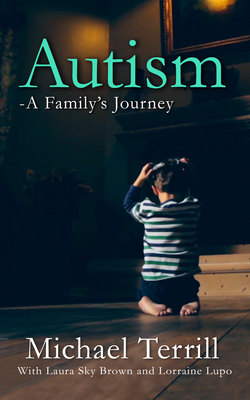Читать книгу Autism: A Family's Journey - Michael Terrill - Страница 6
На сайте Литреса книга снята с продажи.
ОглавлениеA Very Different Start in Life
“J.R. was my second child,” says Lori Cairns. “He and his older sister, Shelby, were only eighteen months apart, but they couldn’t have been more different. Shelby walked when she was nine months old; she talked right on time. She had a large vocabulary. You couldn’t keep her quiet. And she asked so many questions and was so curious about things. J.R. was different. He seemed very into himself. I do remember him smiling and interacting, early on, but then that kind of faded as time went on.”
When J.R. was about 18 months old, Lori remembers trying to get J.R. to look at her. “He was all over the place. That’s the first time, in my mind, at about a year and a half of age, that I thought, I’m not so sure about this. He wasn’t talking. He would cry a lot. I know now that he couldn’t tell me what he wanted, so he would cry. Communicating with him was hard because he didn’t understand what I was saying to him. It was frustrating for us, because we’d tell him to do something and he just didn’t do any of it. We still didn’t understand the scope of what was wrong.”
This was clarified for Lori and her husband, Jim, when one of J.R.’s cousins, Jordan, who is three months older, came to visit over the holidays. As Lori tells it, “we were out in the back yard playing. I remember it distinctly: Jordan was out there with his ball and bat and running all over the place. He and J.R.’s sister Shelby were playing together, while J.R. was over in the sandbox by himself, minding his own business and not interacting with the others at all. My brother, Jordan’s dad, remarked: ‘Look how well behaved J.R. is. He just sits there!’ My husband, Jim, also commented to me, ‘I can’t believe how advanced Jordan is.’ And then we thought, ‘is it that he is so advanced, or is J.R. behind?’. That was when we both went, ‘Oh, wow.’ And we went to see the doctor.”
Jim says, “As a young child, J.R. never really talked, but as time went on, even the level of sounds he was making cut way back, and that seemed pretty strange. We started to put it all in context: the not talking. The not liking interaction. He didn’t necessarily like to have other kids come in and participate in what he was doing. My wife kept telling me there’s something wrong and we need to get help. I said I’d do whatever it took. At his two-year-old wellness check with the pediatrician, we made it clear what we thought: that there was definitely something wrong.”
As Lori explains, “At the well check, I said to the doctor, ‘Please don’t tell me that there’s nothing wrong with him, because I’ll just go to someone else.’ J.R. was sitting in a chair, and the doctor had a book in her hand and said, ‘Hey, J.R., give this book to your mom.’ He completely ignored her. She tried very hard to engage him and get him to play with toys. I don’t think he even realized that a lot of them were toys, because he wouldn’t play with toys. She would try to get him to do the stacking cups—you know, the kind of things that most children love to do—and he couldn’t do it. He couldn’t do any of it. She looked at me and said, ‘Yeah, there’s something going on here.’”
Lori continued, “He wasn’t talking. He didn’t say those words that you’re supposed to have when you’re two years old. His eye contact was horrible. He opened up the cupboards in the kitchen. The doctor did not use the term “autism,” but I’m sure that it was in the back of her mind. “That’s why she started by spending him to a speech pathologist and then to a psychologist—to get him diagnosed.”
“We got the diagnosis when we met with the doctor again. That was sixteen years ago now. In the report, we saw that his speech level, at two years old, was that of a nine-month-old child. It didn’t take too long for her to say, ‘He’s a great kid, but he’s mildly to moderately autistic, and he’s mildly to moderately mentally retarded.’”
This memory brings tears to Lori’s eyes. She continued, “The doctor told us to go home and make sure that J.R. liked his room, because he was going to go in and never come out, and he’d probably be in an institution by the time he was seventeen.”
Jim, also tearing up at the memory, adds, “How the hell can you tell me that? The kid’s one and a half, two years old. I couldn’t believe they were making that kind of diagnosis—not so much the diagnosis of autism, but that they were so damned sure what the results would be.”
One memory stands out as especially painfully for Lori. “There was a park right around the corner from our house, in Tempe, Arizona. After we got the diagnosis of autism, I was driving by, and there were middle-school-aged boys playing football in the park. I watched them running around, having fun together, and thinking to myself, ‘He’s never going to play football.’ And I went home and cried.”
Lori’s sister, Ann Monahan recalls “Lori called me to tell me about it, and I didn’t really understand it. And so for me it was a little weird.” Tearing up, she admits, “At the time, I had to look it up, because I thought maybe he was going to die—that he was never going to be okay. And this was this beautiful little boy whom I had just seen. The whole thing was wrong; it didn’t make any sense.”
